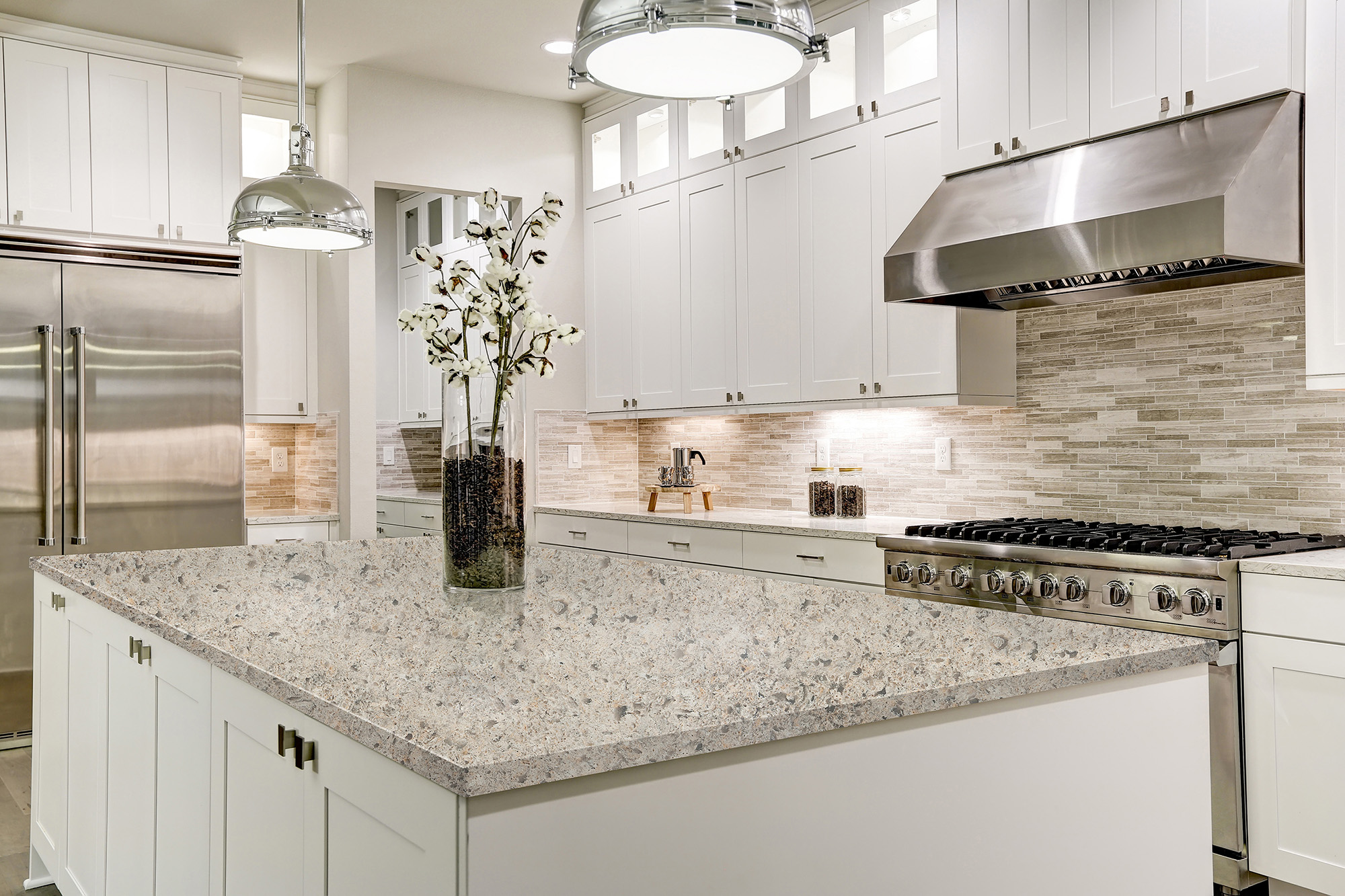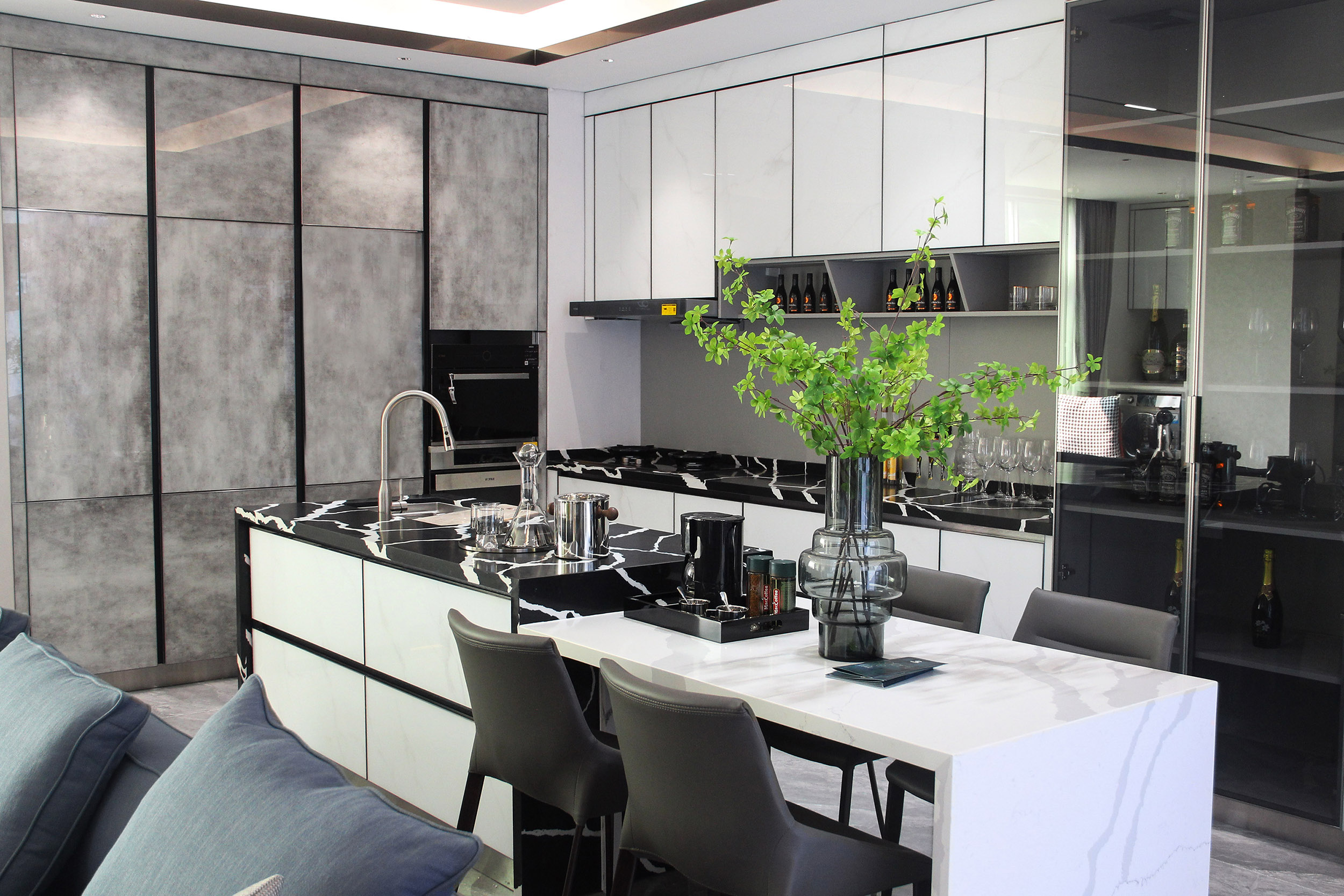Your kitchen counter might look clean after a wipe-down. But is it truly hygienic? Many common countertop materials have microscopic pores where bacteria love to hide, making meal prep less safe than you think.
We get it. You need a surface that genuinely resists germs and makes cleaning easy. This guide explains why quartz kitchen countertops are a top choice for a healthier kitchen.
What exactly does "non-porous" mean for your countertop? Think of it like this: a sponge has tiny holes (pores) that soak up liquids. That's porous. Quartz, on the other hand, is more like a solid sheet of glass. There are virtually no openings for anything to seep into its core.
This structure is the key to its hygienic superpower. Bacteria, viruses, and mold need tiny crevices and moisture to hide and grow. Since quartz offers no hiding spots, spills from food prep or drinks stay right on the surface. A simple wipe-down, and they're gone. Nothing gets trapped underneath.
Many popular natural stones, like granite or marble, look solid but possess microscopic pores. These stones need regular sealing treatments to block those tiny openings effectively. If you skip that sealing, they can potentially harbor germs over time. Quartz completely sidesteps that maintenance requirement.
How does quartz achieve this unified surface? It’s an engineered material. We take finely crushed natural quartz (usually about 90% of the slab) and blend it with high-quality polymer resins and pigments. During manufacturing, these resins fill all the minuscule gaps between the quartz particles, creating that solid, impermeable slab.
This completely sealed surface offers more perks, too:
● Stain Resistance: Spills like coffee, wine, or oil sit on top, making them easy to clean without leaving lasting marks.
● Simple Cleaning: No special cleaners are needed for daily hygiene; soap and water usually do the trick.
● No Sealing Ever: Unlike porous materials, quartz maintains its hygienic properties without needing any sealant applied.
This non-porous nature is the reason quartz is such a clean and low-maintenance choice for kitchen surfaces.

We just covered how quartz has zero pores. This feature does more than block stains; it’s your primary shield against bacteria and mold taking root in your countertop. Simply put, there's no vacancy for germs within the slab itself. They can't burrow in.
Think about what bacteria and mold need to multiply: typically, moisture and an organic food source, often trapped within tiny surface imperfections. Quartz offers neither. Its smooth, solid structure doesn't absorb liquids, and the material itself provides no nutrients for microbes. It’s an inert surface.
This isn't an accident. The way quartz is made – fusing crushed natural stone with resins under intense heat and pressure – creates that uniform, non-reactive surface. Unlike some natural materials with inherent fissures or variations, engineered quartz is consistently dense and unwelcoming to microscopic life.
What does this mean for everyday use? Common kitchen bacteria or mold spores that land on the counter stay on the surface. They don't find hospitable pockets to multiply within the material itself. Effective cleaning physically removes them, preventing unseen colonies from forming deep inside your worktop.
Here's the quick rundown on why quartz resists germs:
● Zero Entry Points: Its non-porous nature blocks access.
● No Sustenance: The material doesn't provide trapped moisture or food.
● Inert Composition: The quartz and resin mix isn't conducive to growth.
● Easy Removal: Germs remain on the surface for simple wipe-downs.
This inherent resistance makes quartz a strong ally in maintaining a hygienic kitchen environment.
Easy Cleaning For Top Hygiene
Keeping your quartz countertop hygienically clean is straightforward, thanks to that non-porous surface we talked about. You don't need aggressive scrubbing or specialty chemicals for daily upkeep to maintain a sanitary prep area.
For everyday cleaning, grab a soft cloth or sponge, warm water, and a small amount of mild dish soap. Wipe down the surface to remove crumbs and residues. Rinse the surface thoroughly with plain water afterward, and dry with a clean cloth to prevent water spots or streaks. Deal with spills promptly when they happen.
Need to disinfect, perhaps after prepping raw chicken or just for extra peace of mind? A spray solution of 70% isopropyl alcohol and water works well. Lightly mist the surface, let it sit briefly (check manufacturer advice, usually under a minute), then rinse well with clean water and dry completely. Some commercial kitchen cleaners are also specifically approved for quartz; check the labels.
Quartz is durable, but not indestructible. To protect its smooth, non-porous shield and keep it hygienic long-term, you need to avoid certain things:
● Harsh Chemicals: Steer clear of bleach, oven cleaners, drain cleaners, paint removers, nail polish remover, or any cleaners with very high/low pH levels. These can damage the resin.
● Abrasive Scrubbers: Never use steel wool, scouring pads, or abrasive powder cleaners. They will scratch and permanently dull the finish. Stick to soft cloths or sponges.
● Extreme Heat: Always use trivets or hot pads under pans, crockpots, or electric skillets. Direct high heat can cause discoloration or cracking (thermal shock).
● Direct Cutting: Use a cutting board every time. While quartz is scratch-resistant, sharp knives can etch the surface over time.
Got dried-on food or a stubborn spot? Gently scrape it away using a plastic putty knife. For trickier marks like permanent marker or paint, first consult your quartz manufacturer's care guide. Often, a targeted cleaner approved for quartz can lift the stain without harming the surface.

We've seen that quartz is non-porous, naturally resists germ growth, and cleans up easily. These features work together, making quartz an outstandingly safe surface for preparing food directly in your kitchen. You gain peace of mind knowing your counter supports clean cooking.
Concerned about bacteria or residues transferring to your food? With quartz, spills or juices from raw vegetables stay right on the surface. They get wiped away completely during cleaning because there are no microscopic cracks or pores for remnants to hide and cause trouble later.
High-quality quartz kitchen countertops use stable resins tightly bonded to natural quartz particles under heat and pressure. This process creates an inert surface. It won't leach unwanted chemicals or significant VOCs (Volatile Organic Compounds) into your food or the kitchen environment. The material itself is designed with safety in mind.
For an extra layer of confidence, look for quartz brands certified by NSF International. This respected independent organization tests products against strict public health standards for food contact safety. Many leading quartz manufacturers hold this certification, signifying the material is suitable for commercial kitchens and your home. Check the specific brand details when selecting your countertop.
Remember our cleaning advice? Always use a cutting board for chopping. While the quartz surface is food-safe for contact, using a board protects its finish from scratches and keeps your knives sharp. It also follows best practices for preventing any potential cross-contamination during meal prep.
Here’s a quick recap of why quartz is a safe bet for food handling:
● Non-Porous: Blocks the absorption of liquids and bacteria.
● Resists Germs: Doesn't provide a habitat for microbes to thrive.
● Easy to Sanitize: Surface cleans thoroughly using simple methods.
● Inert Composition: No harmful leaching of chemicals into food.
● Often NSF Certified: Verified safe for food contact by a third party.
Choosing quartz means you select a durable, attractive countertop that actively contributes to a safer, more hygienic environment for all your family's meals and cooking activities.
When you want a kitchen countertop that genuinely supports a clean home, the material choice is front and center. We've walked through how quartz consistently delivers on hygiene. Its non-porous composition forms the essential foundation for cleanliness.
That solid, sealed surface actively resists bacteria, shrugs off most stains, and makes daily wipe-downs effective. These qualities make hygienic quartz kitchen countertops a top contender for busy, health-aware households seeking reliability and easy maintenance.
Investing in quartz means bringing home a surface that looks fantastic and works hard to maintain a cleaner cooking space day after day. For quality options that embody these benefits, consider exploring the engineered stone surfaces offered by GELANDY. You can see OUR range here. It’s a practical choice for modern kitchen hygiene.